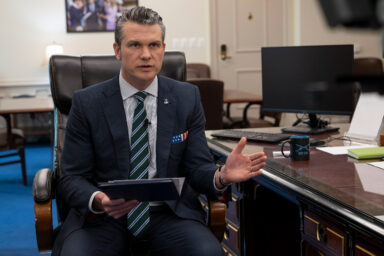How the Bush Team Crushed Clinton’s FEMA
The Hidden Shame of Katrina, Part 4 of Series
In Part 4 of this series, we learn how Bush’s hand-picked team set about dismantling the competent, engaged FEMA team installed under Bill Clinton.
YESTERDAY, WE PUBLISHED PART 3 OF OUR 5-PART SERIES. YOU CAN READ IT HERE . BELOW: PART 4.
FEMA: Ripe for the Picking
As Bush’s Texas team headed for Washington, it was clear that Joe Allbaugh had neither the experience nor the sophistication to serve as the White House chief of staff — the position he coveted. That job went to Andy Card, who had served in the senior Bush’s administration. CNN quoted a “source close to the transition team” who predicted that Allbaugh would become one of two deputy chiefs of staff. Instead, he landed at FEMA.
But why there?
Some speculated that Allbaugh wanted to stay in the White House but that Rove wanted the brusque enforcer out of his way. Some of Allbaugh’s friends said he had grown tired of being at Bush’s beck and call and wanted to “do his own thing.”
If it was a fiefdom he was after, FEMA would do nicely.
Allbaugh had enjoyed being the governor’s interface with emergency agencies during minor crises in Texas — where he would become better known for scandals like blocking an investigation into disgusting embalmer practices by a campaign donor. At FEMA, he would have more than 8,000 employees and a $4 billion budget to play with. The selection was made. Allbaugh — having failed to reveal his bankruptcy, his lawsuits, and the general messiness of his life up to that point — was confirmed by the Senate with minimal scrutiny.
From its inception under Jimmy Carter, FEMA had traditionally been patronage territory. George H.W. Bush appointed Wallace Stickney, a former neighbor of Bush Chief of Staff John Sununu, who had headed New Hampshire’s Department of Transportation and had been an engineer at the Environmental Protection Agency. Stickney presided over FEMA’s inept handling of Hurricanes Hugo and Andrew during the first and last years of the elder Bush’s term — events that many political observers believe contributed to Bush’s loss to Bill Clinton in 1992.
Clinton introduced reforms at FEMA and appointed his former Head of Disaster Management in Arkansas, James Lee Witt, as director. Witt communicated confidence in his agency, its role, and its personnel — FEMA morale soared. Republican Senator Ted Stevens sought to keep Witt on indefinitely, drafting legislation to make the FEMA directorship a longer-term, fixed position. Even George W. Bush praised Witt, leading many to hope that Bush might keep him on.
Allbaugh launched his longest investigation into a headdress that used to hang on James Lee Witt’s wall, a token of appreciation from a Native American tribe in recognition of his efforts following the Oklahoma City bombing. Someone said it might contain feathers from the protected bald eagle — a federal offense — but the probe, which even involved the FBI, fizzled when they turned out to be dyed chicken feathers.
The Kiss of Death
But the candy store was simply too big and tempting to leave to a holdover from the hated Clinton administration.
When Allbaugh took over, Witt introduced him around the offices. He went out of his way to praise the staff of the 8th floor, which contained the front office, congressional affairs, and other key sections. “Apparently, that was the kiss of death,” said a former official who worked on that floor. “From then on, we were not to be trusted.”
The new boss made it clear from the day he arrived that he had little regard for many of his underlings. “Joe Allbaugh didn’t trust many people,” said Trey Reid, a former senior FEMA official. “He was very insular, and had a tight circle.”
The first person Allbaugh brought into that circle was Michael Brown, who, as general counsel, would be presiding over a legal staff of 30. Allbaugh insisted there was no one better suited than Brown — then added a note of unintended irony. “I hired him solely on his ability as a strong ethics attorney,” Allbaugh said in an official FEMA press release at the time. “He is very experienced, knowledgeable, and professional and will be a great asset to the agency and to myself.”
With emphasis (as would soon be clear) on “myself.”
Nixonian Purges
The front office was Allbaugh’s bunker.
Abandoning a tradition of using civil-service professionals for certain vital posts, he quickly staffed up with loyalists. These included Deputy Director Patrick Rhode, Deputy Chief of Staff Scott Douglas, and Acting Deputy Chief of Staff Brooks Altshuler — all political operatives with absolutely no experience in emergency disaster management.
Holdovers from Witt’s tenure, meanwhile, mistrusted Allbaugh in turn, and in some cases even withheld information he’d requested. “In one meeting, Joe made it clear he would have fired everyone if he had his way,” recalled Reid. “If the elevator doors opened [with Allbaugh inside], employees wouldn’t get on. They were afraid of him.”
One senior staffer who did get on an elevator with the hulking Allbaugh made the mistake of complimenting his boss on his fine performance on Meet the Press that weekend. “Why would you care?” Allbaugh snapped.
Out the door, one by one, went the experienced disaster-relief managers. In came the political opportunists and the industry lobbyists. “Many of their skilled management team has left,” said Kanstoroom. “You’ve got a train running down the tracks with nobody driving it.”
Allbaugh soon embarked on a Nixonian purge.
Acting upon his orders, a reluctant inspector general launched a series of internal investigations, looking at everything undertaken by the Witt administration, including Witt’s own travel expenses. Nothing of note was found. On several occasions the IG proclaimed his job done — only to be told to keep looking.
Allbaugh launched his longest investigation into a headdress that used to hang on James Lee Witt’s wall, a token of appreciation from a Native American tribe in recognition of his efforts following the Oklahoma City bombing. Someone said it might contain feathers from the protected bald eagle — a federal offense — but the probe, which even involved the FBI, fizzled when they turned out to be dyed chicken feathers.
With little understanding of — or experience with — large-scale disasters and little patience with federal bureaucracies, Allbaugh was happy to go along with the administration’s view of FEMA — as a bloated entitlement program in need of drastic cutbacks. “His position was that the states ought to take a bigger role,” said Reid.
Why Worry About Floods?
Flood mitigation, a high priority under Witt, received short shrift under Allbaugh.

The Chief of Mitigation, Anthony Lowe, was replaced with a veteran of the insurance industry. Steve Kanstoroom, an independent fraud-detection and pattern-recognition expert, found that FEMA was allowing insurance adjusters to use software that set artificially low settlement amounts for flood victims. He also found that the claims-assessment process was deeply compromised by involvement from insurance industry figures.
At FEMA, as throughout the administration, the foxes had taken over the henhouse and were partying up.
Out the door, one by one, went the experienced disaster-relief managers. In came the political opportunists and industry lobbyists. “Many of their skilled management team has left,” said Kanstoroom. “You’ve got a train running down the tracks with nobody driving it.”
In retrospect, Allbaugh’s most damaging accomplishment at FEMA was pre-positioning Michael Brown as his successor. Allbaugh included him in all key deliberations, even naming him Chief Operating Officer.
Within six months of Brown’s arrival as general counsel of FEMA, Allbaugh was ready to promote him. First, though, he had to oust his current acting deputy director, John Magaw — a former director of the US Secret Service and the Bureau of Alcohol, Tobacco and Firearms, whom Clinton had placed in charge of coordinating domestic-terrorism efforts for FEMA.
“One day, Mr. Allbaugh came in and said, ‘I know you’ve got these other things to do. I’m going to ask Mr. Brown to be deputy,’” recalled Magaw, who was promptly returned to the domestic-terror position assigned him by Clinton. The timing was remarkable.
Just a week prior to September 11, 2001, Allbaugh removed one of the most experienced men in government and replaced him with one of the least experienced.
In December, with the country focused on terrorism and on preventing more attacks, Magaw left FEMA altogether, at the White House’s request, to help start the Transportation Security Administration.
Before Brown could take over permanently as deputy director, he had to face the Senate. In June 2002, he presented a résumé that was riddled with exaggerations about his experience and serious omissions about his financial and legal problems — all of which were on record and could have been exposed with even a superficial vetting. (Brown’s off-the-record acts of fraud would have been harder to prove, unless one talked to the man Brown pushed into a closet. See Part 3 for the details.)
One question on the disclosure form asks, “Do you know why you were chosen for this nomination by the President?” In a meandering written response, he wrote: “I hope the President has nominated me for the position of Deputy Director based on my commitment to the agency and my ability to work closely with the Director.” Brown was confirmed in a cakewalk.
Yet structural change at the agency was imminent. In the aftermath of 9/11, with the public clamoring for coordinated anti-terror responses, it was evident that FEMA could not remain independent.
Bush, having initially opposed the creation of the Department of Homeland Security (DHS), eventually caved to Congressional demands, and Joe Allbaugh began to look for his exit strategy. The moment DHS swallowed FEMA, Allbaugh departed for the private sector, leaving Brown in charge.
Initially, FEMA staffers greeted Allbaugh’s hand-picked successor with a sigh of relief.
Brown was as outgoing as Allbaugh was introverted, as charming as Allbaugh was gruff. On first meeting, people came away feeling like they’d known him for a long time. “I was pretty impressed with him,” said Trey Reid. “He was articulate, bright, a quick study. I didn’t have to spend much time going over things with him.” On the personality front, Brown was a vast improvement.
“Out of luck”
In terms of disaster management, there were two eventualities FEMA lifers always worried about: a really big California earthquake and levee breaks in New Orleans. Worrying and fixing were two different things. Brown, on the advice of aides, asked for more money for levees and catastrophic planning, but neither Congress nor the White House would bite.
If Allbaugh had been disinclined to press Bush for strong remedial action, Brown lacked even the option. He didn’t really have a relationship with the president, and DHS was focused almost exclusively on human-induced violence. “I don’t think any of the budget requests we submitted went through,” said Reid. “Everything went for terrorism.”
With the defections of several senior managers and the firing of others, FEMA’s staff was left paper thin. “At this point, there’s only one person in the building who knows how to do certain things,” said Reid. “If that person gets sick or dies, you’re shit out of luck.”
Despite all the cuts, there was always money for political purposes. Ever mindful of avoiding his father’s mistakes — among them the disastrous handling of Hurricane Andrew in 1992 — Bush was not about to lose to John Kerry over disaster relief.
Under Brown, the response to a series of hurricanes that battered Florida during the 2004 presidential campaign was as choreographed as Bush’s landing on the USS Abraham Lincoln the previous year. Agency staffers were everywhere. Brown was especially visible.
An investigation by the South Florida Sun-Sentinel later found that, following Hurricane Frances, FEMA had handed out tens of millions of dollars to residents and businesses in the Miami-Dade county area, where no deaths and only mild damage occurred — while providing much less assistance to areas that were harder hit but less politically crucial.
By August 2005, Brown was already rumored to be preparing his own escape into the private sector.
Just as Allbaugh had groomed Brown to replace him, Brown in turn had been lining up his own replacement, elevating Patrick Rhode to deputy director.
Rhode, who had been a lowly Bush campaign advance man before he was brought into FEMA, was totally lacking in experience when it came to emergency management. But he had something else. As a former television news anchor and reporter, his public relations and media skills were sharp, perhaps a bit too sharp: It was Rhode who — several days into the Katrina disaster— would call FEMA’s performance “one of the most efficient and effective responses in the country’s history.”
TOMORROW: In Part 5, the final installment of this series, we see the full, ugly consequences of the raping of government by the cynical — and Dick Cheney rears his head.
Related front page panorama photo credit: Andrea Booher / FEMA Photo Library



